托福听力场景题分析
托福听力举例细节题高频出题点及解法示例
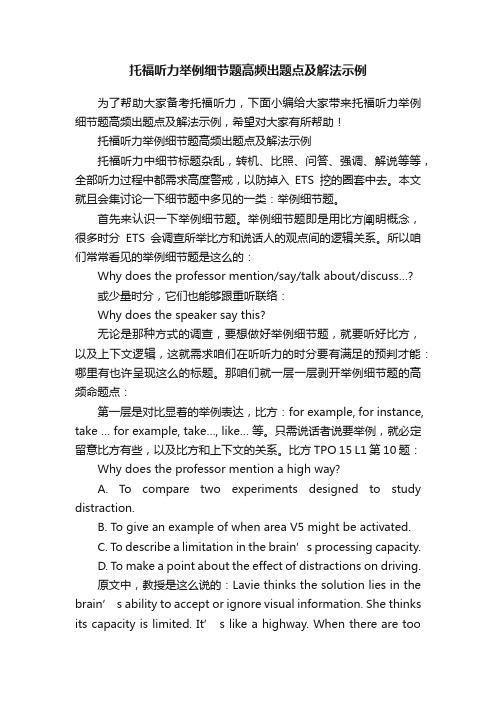
托福听力举例细节题高频出题点及解法示例为了帮助大家备考托福听力,下面小编给大家带来托福听力举例细节题高频出题点及解法示例,希望对大家有所帮助!托福听力举例细节题高频出题点及解法示例托福听力中细节标题杂乱,转机、比照、问答、强调、解说等等,全部听力过程中都需求高度警戒,以防掉入ETS挖的圈套中去。
本文就且会集讨论一下细节题中多见的一类:举例细节题。
首先来认识一下举例细节题。
举例细节题即是用比方阐明概念,很多时分ETS会调查所举比方和说话人的观点间的逻辑关系。
所以咱们常常看见的举例细节题是这么的:Why does the professor mention/say/talk about/discuss…?或少量时分,它们也能够跟重听联络:Why does the speaker say this?无论是那种方式的调查,要想做好举例细节题,就要听好比方,以及上下文逻辑,这就需求咱们在听听力的时分要有满足的预判才能:哪里有也许呈现这么的标题。
那咱们就一层一层剥开举例细节题的高频命题点:第一层是对比显着的举例表达,比方:for example, for instance, take … for example, take…, like… 等。
只需说话者说要举例,就必定留意比方有些,以及比方和上下文的关系。
比方TPO 15 L1第10题:Why does the professor mention a high way?A. To compare two experiments designed to study distraction.B. To give an example of when area V5 might be activated.C. To describe a limitation in the brain’s processing capacity.D. To make a point about the effect of distractions on driving.原文中,教授是这么说的:Lavie thinks the solution lies in the brain’ s ability to acce pt or ignore visual information. She thinks its capacity is limited. It’ s like a highway. When there are toomany cars, traffic is stopped. No one can get on. So when the brain is loaded to capacity, no new distractions can be perceived .笔记顺着教授讲的思路记下来的话,Lavie的主意是capacity is limited,然后用like类推,limited capacity就和highway建立了联络,而标题也恰是调查这种联络,所以倒着推到like的前一句即是举例的逻辑答案。
托福TPO01听力答案详细解析
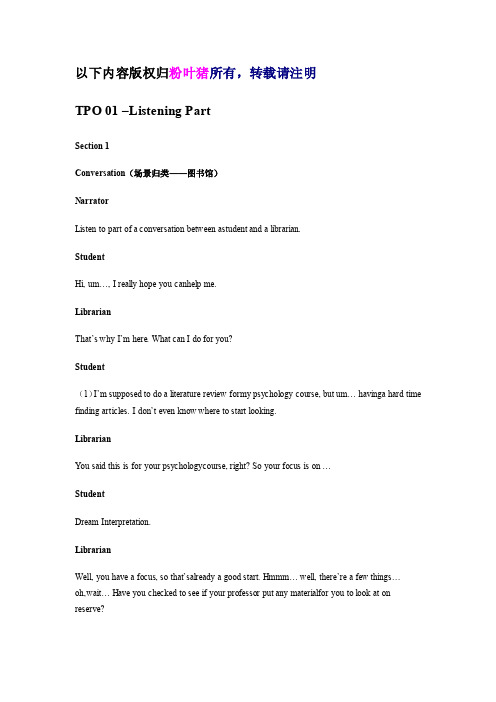
以下内容版权归粉叶猪所有,转载请注明TPO 01 –Listening PartSection 1Conversation(场景归类——图书馆)NarratorListen to part of a conversation between astudent and a librarian.StudentHi, um…, I really hope you canhelp me.LibrarianThat‟s why I‟m here. What can I do for you?Student(1)I‟m supposed to do a literature review formy psychology course, but um… havinga hard time finding articles. I don‟t even know where to start looking.LibrarianYou said this is for your psychologycourse, right? So your focus is on …StudentDream Interpretation.LibrarianWell, you have a focus, so that‟salready a good start. Hmmm… well, there‟re a few things… oh,wait… Have you checked to see if your professor put any materialfor you to look at on reserve?StudentAha, that‟s one thing I did know to do. I just copied an article, but I still need three more on my topicfrom three different journals.LibrarianLet‟s get you going onlooking for those then. We have printed versions oftwenty psychology journals in the Reference Section. These are the onespublished within the last year. Then I think about it…there‟s a journal named Sleep and Dream.StudentOh, yeah, the article I just copied is fromthat journal, so I‟vegot to look at other sources.Librarian(2)Ok, actually, most of our materials are available electronicallynow. You can accesspsychology databases or electronic journals and articles through the library‟s computers,and if you want to search by title with the word …dream‟ for example, just type it in and all the articles with “dream” in the title will come up onthe screen.StudentCool, that‟s great! Too bad I cannotdo this from home.Librarian(5)But you can. All of the library‟s databasesand electronic sources can be accessed through any computer connected to theuniversity network.StudentReall y?!I can‟t believe I didn’t know that. It still sounds like it‟s goingto take a while though, you know, going through allof that information, all of those sources.LibrarianMaybe, but you already narrow your searchdown to articles on Dream Interpretation, so it shouldn‟t betoo bad. (3)And you probably notice that there‟s an abstract or summary at the top ofthefirst page of the article you copied. When you go into the databases andelectronic sources, you have the option to display the abstracts on the computer screen, skimmingthose to decide whether or not you want to read thewhole article should cut down some time.StudentRight, abstracts! They‟lldefinitely make the project more durable. (4)I guess Ishould try out the electronic search while I‟m stillhere then, you kno w, just in case.LibrarianSure, er… that computer‟s free over there, and I‟ll be here tillfive this afternoon.StudentThanks, I feel a lot better about this assignment now.词汇:journal n. 日报;杂志version n. 版本database n. 数据库abstract n. 摘要skim v. 浏览assignment n. 任务;作业durable adj. 耐用的;持久的题目:1Why does the student go to see the librarian?解析:注意but后面的内容,他是要找一些资料为了做a literature review,同义替换为 a class paper答案:To ask about how to look forresources for a class paper2What does the librarian say about theavailability of journals and articles?解析:细节题,定位journals and articles,原文中说可以从the library‟scomputers获得,同义替换为in an electronic format答案:Most of them are accessible inan electronic format3 What does the librarian suggest the studentshould do to save time?解析:细节题,题目中save time同义替换原文中cut down some time,原文中skimming these (summaries and abstracts)同义替换为read the summaries答案:Read the summaries of the articlesfirst4What can be inferred about why the womandecides to use the computer in the library?解析:推断题,原文中她说just in case,可推断她可能需要管理员的帮助。
出国考试 新托福听力如何利用场景猜出答案
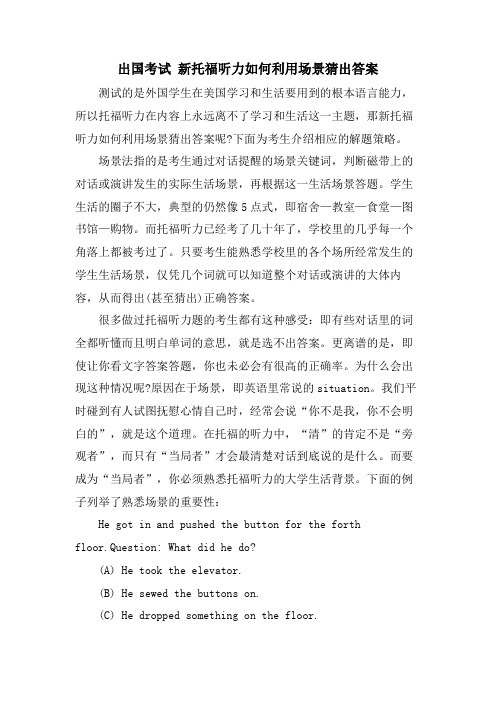
出国考试新托福听力如何利用场景猜出答案测试的是外国学生在美国学习和生活要用到的根本语言能力,所以托福听力在内容上永远离不了学习和生活这一主题,那新托福听力如何利用场景猜出答案呢?下面为考生介绍相应的解题策略。
场景法指的是考生通过对话提醒的场景关键词,判断磁带上的对话或演讲发生的实际生活场景,再根据这一生活场景答题。
学生生活的圈子不大,典型的仍然像5点式,即宿舍—教室—食堂—图书馆—购物。
而托福听力已经考了几十年了,学校里的几乎每一个角落上都被考过了。
只要考生能熟悉学校里的各个场所经常发生的学生生活场景,仅凭几个词就可以知道整个对话或演讲的大体内容,从而得出(甚至猜出)正确答案。
很多做过托福听力题的考生都有这种感受:即有些对话里的词全都听懂而且明白单词的意思,就是选不出答案。
更离谱的是,即使让你看文字答案答题,你也未必会有很高的正确率。
为什么会出现这种情况呢?原因在于场景,即英语里常说的situation。
我们平时碰到有人试图抚慰心情自己时,经常会说“你不是我,你不会明白的”,就是这个道理。
在托福的听力中,“清”的肯定不是“旁观者”,而只有“当局者”才会最清楚对话到底说的是什么。
而要成为“当局者”,你必须熟悉托福听力的大学生活背景。
下面的例子列举了熟悉场景的重要性:He got in and pushed the button for the forthfloor.Question: What did he do?(A) He took the elevator.(B) He sewed the buttons on.(C) He dropped something on the floor.(D) He made him go upstairs.这个单句题(现在的听力局部没有这种单句题),如果你不熟悉电梯的话,你会一头雾水,根本不知其所云何事。
但是,如果你一听到就想到了电梯的话,那么这根本不是问题。
托福TPO18听力答案详细解析
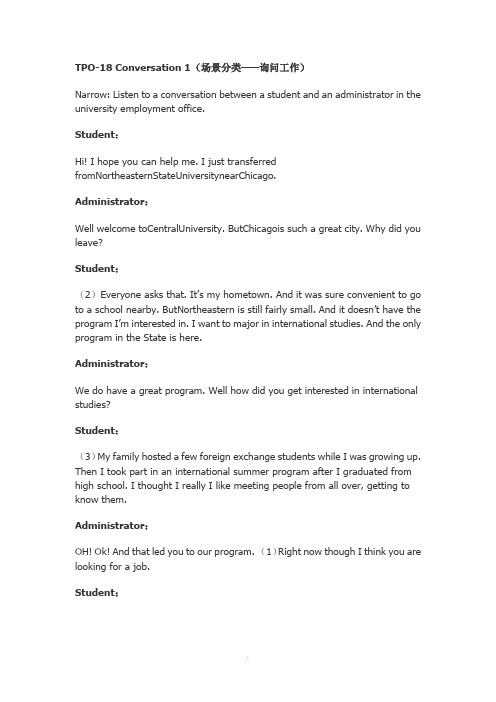
TPO-18 Conversation 1(场景分类——询问工作)Narrow: Listen to a conversation between a student and an administrator in the university employment office.Student:Hi! I hope you can help me. I just transferred fromNortheasternStateUniversitynearChicago.Administrator:Well welcome toCentralUniversity. ButChicagois such a great city. Why did you leave?Student:(2)Everyone asks that. It’s my hometown. And it was sure convenient to go to a school nearby. ButNortheastern is still fairly small. And it doesn’t have the pro gram I’m interested in. I want to major in international studies. And the only program in the State is here.Administrator:We do have a great program. Well how did you get interested in international studies?Student:(3)My family hosted a few foreign exchange students while I was growing up. Then I took part in an international summer program after I graduated from high school. I thought I really I like meeting people from all over, getting to know them.Administrator:OH! Ok! And that led you to our program. (1)Right now though I think you are looking for a job.Student:Yeah, a part time job on campus. I thought I’d save money, being away from the big city. But it doesn’t seem to be working that way .Anyway I’m not having much luck.Administrator:I’m no t surprised. Most of our campus jobs are taken in the first week or two of the semester. What work experience have you had?Student:Well, I worked in the university library last year. But I already checked at the library here. They said their remaining positions were for work-study students getting financial aid. I’ve never run into that before.Administrator:Well, I guess each school has its own policies. (5)Uh, we really don’t have much right now. You might be better waiting until next semester. If you really want something, how are your computer skills?Student:About average I’d say. I helped teach some of the basic computer classes. Northeastern offers for new users, if that helps any?Administrator:OK, the technology support department needs people to work its helpdesk. It’s basically a customer service job, answering questions, helping people solve their computer problems, give you a chance to develop your people skills. Student:Something every diplomat needs. But is there some problem? I mean why is the job still open?Administrator:(4)Well, they have extended hours, from 6am to 2am every day. So they need a large staff. But right now they only need people early mornings, late nights, and weekends. You’d probably end up with a bit of everything ra ther than a regular spot. On the bright side you’ll probably be able to get some studyingdone between calls. At least it could be a start and then you can try for better hours next semester.Student:Um, I see why the hours might be a problem. But I guess I can’t afford to be too picky if I want a job. Still maybe we can work something out..词汇:diplomat n. 外交家helpdesk n. 帮助台spot n. 地点picky adj. 挑剔的;吹毛求疵的题目:1. Why does the student go to the university office?解析:主旨题,文中学生找管理员主要是想寻求工作机会。
实例讲解析托福听力场景题原文解析-图书馆场景

实例讲解析托福听力场景题原文解析-图书馆场景在托福的备考过程中,很多学生都会相信一句话:得听力者得天下。
也就是说听力的得失,对于自己托福考试的成功与否起着很大的影响。
而在这其中,我们有需要使用怎样的备考方法呢?其实对于托福听力来说,最为关键和重要的就是场景词的准备。
下面我们就为大家介绍一下有关图书馆场景的举例分析吧。
图书馆场景在托福听力中出现所涉及的内容一般如下:资料种类,书刊状态,相关动词,图书馆各部门名称,图书馆相关政策与服务。
首先请看以下这段听力原文:Librarian: Can I help you?Student: Yeah, I need to find a review. It’s for my English class. We have to find reviews ofthe play we are reading. But they have to be from when the play was first performed, so I needto know when that was and I suppose I should start with newspaper reviews and…分析:这是TPO 4 Conversation 1的开头部分,学生直接表明前来图书馆的目的。
在笔记过程中开头处开门见山表明主旨内容以及直接目的的语句是一定不能放过的,故其中的review, newspaper review等书刊种类词汇就是必记词汇,同时因果原则告诉我们so后的内容是很有可能出考题的,when…start with也应该出现在我们的笔记中。
再看这个conversation之后需完成的第一道题:Q1. Why does the man need the woman’s assistance? Click on 2 answers.m He does not know the publication date of some reviews he needs.m He does not know the location of the library’s video collection of plays.m He does not know how to find out where the play is currently being performed.m He does not know how to determine which newspaper he should look at.根据笔记可选出答案:第一个选项。
托福听力对话conversation常考场景罗列介绍
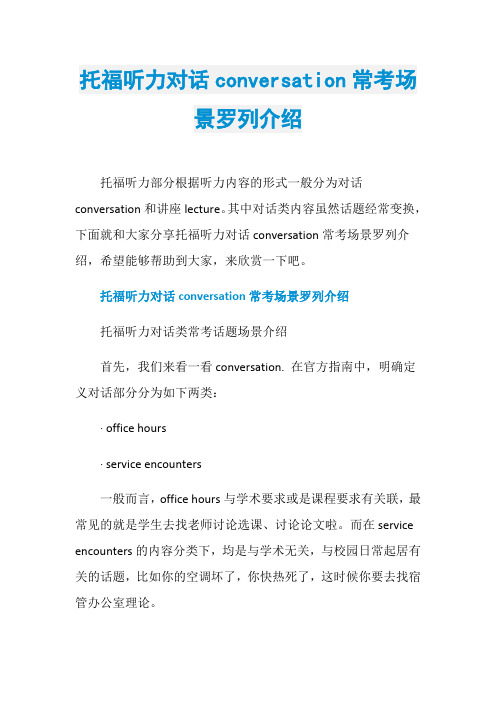
托福听力对话conversation常考场景罗列介绍托福听力部分根据听力内容的形式一般分为对话conversation和讲座lecture。
其中对话类内容虽然话题经常变换,下面就和大家分享托福听力对话conversation常考场景罗列介绍,希望能够帮助到大家,来欣赏一下吧。
托福听力对话conversation常考场景罗列介绍托福听力对话类常考话题场景介绍首先,我们来看一看conversation. 在官方指南中,明确定义对话部分分为如下两类:· office hours· service encounters一般而言,office hours与学术要求或是课程要求有关联,最常见的就是学生去找老师讨论选课、讨论论文啦。
而在service encounters的内容分类下,均是与学术无关,与校园日常起居有关的话题,比如你的空调坏了,你快热死了,这时候你要去找宿管办公室理论。
托福听力conversation话题类型分析更细致地进行分类,官方真题Official当中conversation的话题可以分作图书馆、打工、校园生活及选课几种场景图书馆·找不到书、不知道通过什么方式找·图书馆规定:过期书催还、不知道是否需要立即还书·介绍图书馆打工·招工场景·学生之间、学生和老师之间谈论工作的场景校园生活·学生租房子·宿舍问题:管理制度、室友不好相处、宿舍条件差选课·学生和学生之间讨论选课·学生和老师讨论选课:课程太难听不懂/学生课程太多cannot catch up /学生基础太差托福听力考试技巧解析首先考生需要熟悉题型主要包括主旨题、细节题、功能题、立场题和关系题。
对话一般涉及2-3个对话者,内容具有北美大学校园生活特色,场景主要是办公室和学生服务。
相对而言对话部分比较容易,重点掌握*主旨和说话者的态度就可以了。
新托福听力场景-地球环境学科解题技巧详解
新托福听力场景-地球环境学科解题技巧详解在之前的文章中,有为考生们讲解过地理地质学的内容,在本篇,我们进一步来研究一下地球环境学科。
前者往往和化学以及考古学有所交叉,后者的内容更接近我们的实际生活或认知,比如环境变化。
当然也会涉及到许多场景词汇,广大考生在备考过程中还是要认真复习备考。
下面将带领大家具体看一下地球环境学类的听力段子应该如何应对。
一、概述这一学科要求考生们要关注一些时事,并且扩大自己知识面,开拓视野,可以和地理地质学科一起关注。
☆大气环境,例如赤道无风带,大气环流,全球气候变化。
☆地面环境,例如风能,地下水的研究与保护。
☆海洋环境,例如海底热液,潮汐能。
☆其他话题,可能和天文学,生物学,地理地质学等产生交叉。
在此,考生最好能积累背景知识,多浏览一些原汁原味的报刊杂志,比如Scientific Americans、NationalGeographical等等,多积累相关词汇,熟悉发音。
当然,刚才也提到了,新托福听力段子所涉及的话题往往千变万化且有所交叉,考生在熟悉背景知识的同时也要打牢基础,培养快速辨音能力和短时记忆能力,才能以不变应万变。
二、案例分析请看一个地球环境学的经典案例:E.G.TPO17 Milankovitch Hypothesis听力原文:1) Ok, so we have been talking about theories that deal with the effects ofhuman activity on the climate. But today I’d like to talka little bit aboutother theories that canexplain variations in climate. And one of the best-knownis called the Milankovitch HypothesisQ:What is the lecture mainly about?AA hypothesis that explains how changes in Earth’s motions affectclimate.BA hypothesis that explains why the shape of earth’s orbit varies overtime.CReasons it is difficult to find evidence to support hypotheses about theclimate.DAnalyses of the accuracy of data collected in different ways.分析:这是一道简单的主旨题。
托福听力对话这些场景会讨论什么问题
托福听力对话这些场景会讨论什么问题托福听力对话这些场景会争论什么问题?今日给大家带来了托福听力对话这些场景会争论什么问题,盼望能够关心到大家,下面就和大家共享,来观赏一下吧。
托福听力对话这些场景会争论什么问题?托福听力对话场景主题介绍:考试常见的场景有同学找教授分析成果低的缘由,给出解决方法;询问考试范围,考试复习,讲解某个学问点;也会遇到同学因个人缘由错过考试而补考或写论文弥补。
托福听力对话场景主题介绍:学问点确认常见的场景有同学在课堂上听到一个专出名词或者学问点不明白,课后去询问教授。
托福听力对话场景主题介绍:工作同学为了赚取生活费用或者学费或积累工作阅历从事兼职工作,常见的场景有工作面试中谈论工作要求,待遇和内容;同学和教授结合本专业和爱好,谈论工作意向。
托福听力对话场景主题介绍:其他包括食堂场景:饭菜好不好吃,饭卡套餐之类的。
宿舍场景:宿舍的支配,校外租房,房间的问题(设施设备坏了),室友的问题(有冲突)。
了解这些场景可能消失的对话主题后,考生就能在听到的第一时间猜测出之后可能会详细绽开的内容,这样一来大家想要更为精确地抓住考点信息信任也就会轻松很多了。
托福听力:重点考察的几项原则总述主旨,主题处必考,以识别文中开头处或每段中不停重复的关键词或者高频词为文章主题核心内容所在。
通过托福听力真题可以看出这是主题题必考的考点。
支持主题或者主论点,分主论点的重要细节和举例等。
这是细节题的主要考察原则。
听力文中消失的新术语或者生疏概念,必需要关注其后的解释部分。
解释说明新生事物是ETS常在听力中设置的考查重点。
细节题的主要考察原则之一,但许多时候这个概念会贯穿整个文章从而涉及文章主旨,故而不能不重视其所扮演的特别角色。
观看关注演讲或者对话绽开的挨次与结论结构的组织方式。
这是结构题的考点,有时候功能理解题和意图题也会涉及此类考点,在托福听力陪训中肯定要留意。
多熟识类似功能说话题的英文规律思维特征,由于这是功能说话题的考点。
托福听力场景解析法
托福听力场景解析法场景方法可行的缘由仍在于ETS的出题原则,大家确定已经特别熟识TOEFL听力考试中的同学生活原则,它是ETS坚决不移的出题原则,这一原则使TOEFL听力从内容上永久离不了同学生活这一中心。
同学生活的圈子是很小的,学校的校内也就那么大一点儿,而TOEFL 听力已经考了几十年了,所以学校里的每一寸上都不知被考过多少遍了。
过去考的是这些东西,将来考的仍是这些东西。
考生在考前只要把学校里的主要场所(如图书馆、食堂等)中常发生的重要而又典型的同学生活场景加以熟识,寥寥几个词便可以知道整个段子或对话的基本内容,而答案也就唾手可得。
这一方法所需的预备工作相当简洁,较次要的场所和少见的场景考生甚至可以置之不理。
但它的作用又相当大,在此列出三点,略作说明:作用一,做过一些TOEFL听力题的人都会有种感觉:即TOEFL 听力,尤其是小对话题中有相当数量的题目仅靠听清字面意思尚做不出答案,还必需生动形象地想象出对话发生的详细环境和生活场景。
在这里场景的方法是一个必需,考生的英语水平再高,语言力量再强都无助于这些题目的.得分。
而且,ETS这种浅显的思想还在连续进展之中。
这使得场景的方法在1995年8月改革后的新题中更加重要。
由于1995年8月后的新题有更多的题目需要在语言之外再推出场景,并且推出这些新题的场景需要绕的圈子更多、转的弯更多,也需要考生有更丰富的想像力。
这根本不是在考语言,而是在考演员。
长时间接触TOEFL听力,最终悟到了它的真谛:就是极端无聊、没劲。
无奈,这更多的弯子也是很多考生感到新题难度增加的缘由之一。
不过,尽管从字面上听这些新题难度是有所增大,可一旦把握了场景的方法反而会觉得它们的难度减小了、技巧性也更强了。
考生可参见IMPLY/INFER题型和下面场景的其次大作用。
场景方法可为考生供应更加有效的技巧,而且这些技巧的有效程度也更加令人惊讶。
同学生活原则确定了TOEFL听力中涉及的常见生活场景的有限性和它们的高重复率。
托福听力:四大常考场景剖析
托福听力:四大常考场景剖析托福听力包括对话和讲座两部分的内容。
对话内容主要涉及到校园场景。
讲座内容涉及到的话题比较多,主要是和课程相关的专业性话题。
针对托福听力中出现的话题和场景,本文给大家整理了托福听力场景分类汇总,帮助考生了解听力的主要话题,更加有针对性地准备相应话题的内容。
一、学校生活类场景:这类话题主要出现在听力对话中。
对话中有一个套路就是,在对话双方见面的时候,其中一个人A会表现或者提出自己的一个问题,然后两个人针对这个问题进行讨论。
之后,另外一个人B会给A提出几条建议,然后A从中选择一个建议。
细化学校生活的场景可以分成以下五个方面:1. 食堂场景:对话双方讨论饭菜好不好吃、食堂的优惠政策、卫生安全等话题;2. 宿舍场景:宿舍的安排、学生校外租房、房间设施问题、室友之间相处问题;3. 图书馆场景:找不到想借的书、还书过期、图书馆准备考试、准备论文;4. 假期场景:假期去哪玩、回忆假期去过哪、有什么好玩的;5. 办公室场景:请假、延期交作业、论文准备、选课。
二、学校部门类场景:1.注册:开学注册程序问题、选课选不上、关于缴费使用现金还是银行卡;2.维修部:教室的桌椅损坏、宿舍的物品损坏(灯、桌椅、门)、协调修理时间;3.勤工俭学:兼职工作,主要涉及到工作和课程冲突,如何协调。
三、课程类场景:1.老师上课开头方式:(1)直接引入式:今天要讲这部分内容是……;或者我们要补充讲一些背景知识。
(2)课堂回顾式:回顾一下上次课讲的内容,然后接着上次的内容讲或者讲新的内容。
(3)直接说我们今天讲什么内容。
然后开始讲。
(4)今天是复习课,然后讲某某考试,复习跟考试有关的内容。
2.老师下课结束方式:主要是回顾一下当次课的主要内容,然后,交待可课下或者课后的任务或者安排:(1)交待在具体之后什么时间要考试,题型学生复习;(2)根据本堂课的内容,布置作业,强调作业要求;(3)介绍一下下次课的安排和内容;(4)老师下节课请假,找代课老师或者别的安排。
- 1、下载文档前请自行甄别文档内容的完整性,平台不提供额外的编辑、内容补充、找答案等附加服务。
- 2、"仅部分预览"的文档,不可在线预览部分如存在完整性等问题,可反馈申请退款(可完整预览的文档不适用该条件!)。
- 3、如文档侵犯您的权益,请联系客服反馈,我们会尽快为您处理(人工客服工作时间:9:00-18:30)。
北京石油管理干部学院学报Journal of BPMTI2006年第2期72许多学生都认为托福题难,而托福听力是难中之难,怎么能提高托福听力,先以托福听力Part A中的场景对话为例来分析总结听力规律和技巧。
托福听力Part A中有许多场景对话题,有些场景题是经常出现的,而且是有规律的。
虽然组成场景对话的句子有些是简单句,但它主要是口语表达,语言非常简练,而且有的学生不了解有些场景题的背景知识,在听的时候还是有难度的。
所以在本文中归纳一些常见场景题,而且是学生容易做错的题,并加以分析。
一、帮助场景规律:第一个人提出是不是需要帮助,第二个人的回答无外乎是接受或拒绝帮助,经常是间接拒绝帮助。
例题1。
Test 1 (2)Man: Need a hand with those boxes?Woman: That’s OK, I can manage, they are empty.-What does the woman mean?(A) The man should have offered his assistance earlier.(B) She doesn’t need the man’s help.(C) She didn’t realize the boxes were empty.(D) She wants the man to move the boxes.分析例题:男士:需要帮助拿那些盒子吗?女士:没关系,我拿得了,它们是空的。
问:这位女士是什么意思?当听到Need a hand with sth..这个标志句型,就可推断出是帮助场景题。
第一个人提出是否需要帮助,第二个人不是直接拒绝帮助I don’t need any help, 而是用了mange和empty 这两个关键字,既然盒子是空的,当然无须帮助,所以正确答案是(B)。
如果学生在听的过程中能抓住manage 和empty 这两个字,这道题就迎刃而解了。
例题2。
Test 2 (3)Woman: Excuse me, could you bring me a glass of water,please?Man: Sorry, but I’m not waiter.-What does the man mean?(A) He wants a glass of water.(B) He won’t do as the woman asks.(C) He can’t wait any longer.(D) He’s looking for the waiter.分析例题:女士:对不起,请你帮我拿一杯水?男士:对不起,我不是服务员。
问:这位男士是什么意思?当听到Could you do me sth.这个请求帮助标志句型,就可知道是帮助场景。
第一个人要求帮助,第二个人拒绝帮助。
此题学生容易做错,是因为第二个人的讲话不是直接拒绝,而是间接拒绝,意思是我不是服务员, 当然不会给你拿水,所以正确答案是(B)。
此题有的学生选(D),是因为学生听到waiter 这个字,以为第二个人在找waiter。
例题3。
Test 3 (2)Man: Need a ride home?Woman: Thanks...but...my apartment is just around thecorner. Besides, I need fresh air.-What will the woman probably do?(A) Accept the man’s offer.(B) Walk home.(C) Give the man a ride.(D) Go for a walk with the man.分析例题:男士:需要搭车回家吗?女士:谢谢...但是...我的公寓正好在附近,而且我需要呼吸新鲜空气。
问:这位女士将会做什么?当听到Need a ride home?这个标志句型,就可以判断是帮助场景。
第一个人提出是否需要帮助,第二个人间接拒绝帮助,我的公寓正好在附近,而且我需要呼吸新鲜空气,言外之意我想步行回家,而不用搭车,所以正确答托福听力场景题分析顾谢巧案是(B)。
此题学生如能听出言外之意,就不会做错了。
二、噪音场景规律:(1)噪音的来源:来自室友,来自周围环境,来自建筑工地等。
(2 ) 有噪音,如何解决。
例题1。
Test 1 (6)Man: Do you have to play that music so loud? I’ve gota test tomorrow!Woman: Sorry, I didn’t realize you were studying.-What will the woman probably do?(A) Turn down the volume.(B) Help the man study for a test.(C) Play a different kind of music.(D) Speak louder.分析例题:男:难道你必须如此大声放音乐?我明天有考试!女:对不起,我没意识到你正在学习。
问:这位女士将会做什么?当听到loud这个标志词,可推断是噪音场景题。
第一个人抱怨太吵(噪音来自室友),因为第二天有考试要复习功课。
由于第一个人抱怨了,第二个人才意识到他在学习,为了表示歉意,当然就会关掉或关小音量,所以正确答案是(A)。
有学生问为什么不选(C), 因为第一个人抱怨的是音乐声太大,如何解决这个问题当然是把音量关小,而不是播放另一种音乐。
例题2。
Test 4 (1)Woman: You know, the noise in my dorm has reallygotten out of control. My roommate and I can rarely get tosleep before midnight.Man: Why don’t you take problem up with the dormsupervisor?-What does the man suggest the woman do?(A) Discuss the situation with the person in charge of thedormitory.(B) Ask her roommate not to make so much noise.(C) Go to bed after midnight.(D) Send a letter to the residents.分析例题:女:你知道我宿舍的噪音确实失控。
我和我的室友在半夜前几乎不能入睡。
男:你为什么不提出噪音问题请宿舍主管考虑解决。
问:男士建议女士做什么?当听到noise这个标志词,就可判断是噪音场景题。
第一个人抱怨室内噪音,第二个人提建议如何解决,当然正确答案是(A)选项---为什么不提出噪音问题请宿舍主管考虑解决,而不是(B)选项---要求室友不要弄出这么大的噪音,因为这噪音并不是室友造成的。
也不是(D)选项---给居民寄信,本来这也是一种解决问题的方式,但此题的解决方式是把噪音问题请宿舍主管解决。
例题3。
Test 14 (12)Woman: Could you turn down your stereo a bit? I reallycan’t concentrate on my book.Man; Why didn’t you just say so?-What can be inferred about the man?(A) He didn’t realize that he was disturbing the woman.(B) He doesn’t understand why the woman can’tconcentrate.(C) He didn’t hear what the woman said.(D) He thinks the woman should turn off the stereo.分析例题:女:你能把声音调小点吗?我确实不能集中精力看书。
男:你为什么不早说?问:关于这男士能够推断出什么?当听到turn down, stereo 标志词,就可知道是噪音场景。
女士嫌吵请男士把声音调小点,男士说你为什么不早说?意思是他没有意识到干扰了女士,所以正确答案是(A)。
三、基础课场景规律:托福听力主要考的是美国校园文化,选课是非常重要的一部分。
(1 ) 要上高水平课之前,要先选基础课,introductory courses or prerequisite, 如果没有学过基础课,那一定要得到任课教授的批准才能选高级水平的课。
(2 ) 选基础课的人多,班都满了。
例题1。
Test 14 (29)Woman: I saw you coming out of Professor Young’soffice this morning. Were you asking her for more time tofinish your project?教育培训2006年第2期73北京石油管理干部学院学报Journal of BPMTI2006年第2期74Man: No, I just had to get her signature to take an upper-level seminar. I haven’t taken the introductory course.-What did the man speak to the professor?(A) To ask for special permission to take a class.(B) To discuss his grade.(C) To find out about an introductory course.(D) To discuss his project.分析例题:女:今天早晨我看到你从杨教授办公室出来,你是不是要求杨教授多给你些时间完成你的作业?男:不,我还没学过基础课,要学较高水平的研讨课,我只是必须得到她的签字。
问:男士对教授说了什么?当听到introductory course ,upper-level seminar, 标志词,就可知道是基础课场景。
Get teacher's signature ---得到老师的签字,意思是得到老师的批准---get teacher’spermission。
因为我没有学过基础课,如果要想学较高水平的课,就要得到教授的批准,所以正确答案是(A)。
此题如果学生了解美国校园文化,就会理解对话,所以教师在听力课上要适当地介绍美国的文化背景知识。
